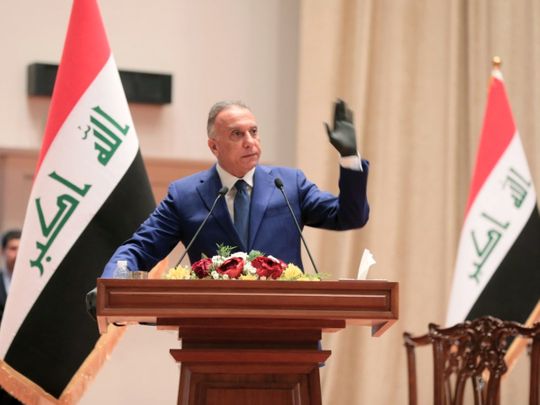
Iraq has invited several countries in its neighbourhood in addition to Gulf states and France, to a summit that is being billed as a substantial effort by Baghdad to ease regional tensions and open a new dialogue, especially on both sides of the Arabian Gulf.
Bagdad, which declared victory over the terror network Daesh three years ago, has been steadily regaining relative stability although a number of armed militias, mostly created and armed by Iran, continue to operate outside the realm of the Iraqi state’s authority. But as Prime Minister Mustafa Al Kadhimi said on several occasions, Iraq, traditionally a major player in the Middle East political structure, will not be as stable as it should be whilst there are tensions around.
Iraq has invited leaders of neighbouring countries — Saudi Arabia, Jordan, Kuwait, Turkey and Iran, in addition to key regional players — the UAE and Egypt — to the summit, which reports suggest is likely to take place on Saturday. French President Emmanuel Macron has said he will attend, so will a senior official from the European Union. The stated aim of the conference is to open a direct dialogue between the participants to ease the current tensions in the region.
Iraqi officials say the summit will naturally discuss the war in Yemen, Lebanon’s deteriorating political and economic crisis and a host of other hot regional issues including water crisis. Taliban’s swift takeover of Afghanistan is also being discussed. But it is understood that the conference will more importantly witness direct talks between Gulf States and Iran. A few earlier rounds of talks between Saudi and Iranian officials is seen as a bid by Baghdad to mediate in the restoration of ties between the two countries, which were severed in 2016 following an attack on the Saudi embassy in Tehran by thousands of Iranians, believed to be affiliated with an officially paramilitary militia.
Iran’s role in Yemen, through its extensive support with arms, drones and training to Al Houthi militias, and Lebanon, dominated by Tehran’s main regional proxy, Hezbollah, and its almost complete control over Iraq’s militias such as Badr, Iraqi Hezbollah and Asa’ib Al Haq, are widely recognised as the main source of tension in the Middle East.
Thus, the conference is an important platform to discuss Tehran’s destabilising and hostile policies. However, it might be too early to expect a major breakthrough. Nevertheless, Al Kadhimi must be credited for calling for this meeting.
The Iraqi premier, who took over in May last year, seeks to play an active mediation role regionally despite his country’s own lingering problems — the threat of the pro- Iran militias which view him as too close to the US, shrinking economy that has been reeling under the Covid-19 effects and the fragile security situation due to the frequent attacks by the militias on US and foreign interests.
He knows that regional tranquillity and a new order, one based on economic and trade collaboration, will enhance chances in his pursuit to restore stability in Iraq.








